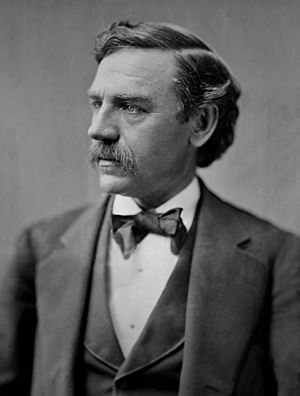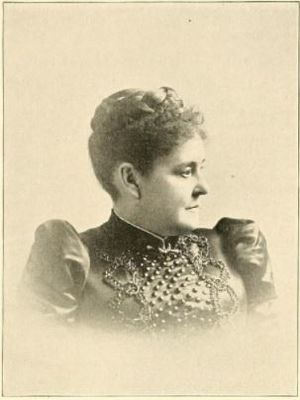William P. Frye facts for kids
Quick facts for kids
William Pierce Frye
|
|
|---|---|
 |
|
| President pro tempore of the United States Senate | |
| In office February 7, 1896 – April 27, 1911 |
|
| Preceded by | Isham G. Harris |
| Succeeded by | Rotating pro terms |
| United States Senator from Maine |
|
| In office March 18, 1881 – August 8, 1911 |
|
| Preceded by | James G. Blaine |
| Succeeded by | Obadiah Gardner |
| Chairman of the House Republican Conference | |
| In office March 4, 1879 – March 3, 1881 |
|
| Speaker | Samuel J. Randall |
| Preceded by | Eugene Hale |
| Succeeded by | George M. Robeson |
| Member of the U.S. House of Representatives from Maine's 2nd district |
|
| In office March 4, 1871 – March 17, 1881 |
|
| Preceded by | Samuel P. Morrill |
| Succeeded by | Nelson Dingley, Jr. |
| Maine Attorney General | |
| In office 1867–1871 |
|
| Governor | Joshua Chamberlain |
| Preceded by | John A. Peters |
| Succeeded by | Thomas Brackett Reed |
| Member of the Maine House of Representatives | |
| In office 1861–1862, 1867 |
|
| Personal details | |
| Born | September 2, 1830 Lewiston, Maine, U.S. |
| Died | August 8, 1911 (aged 80) Lewiston, Maine, U.S. |
| Resting place | Riverside Cemetery |
| Nationality | American |
| Political party | Republican |
| Relations | Wallace H. White Jr. (grandson) |
| Alma mater | Bowdoin College Bates College (LL.D.) |
| Occupation |
|
| Signature | |
William Pierce Frye (born September 2, 1830 – died August 8, 1911) was an important American politician from Maine. He was a member of the Republican Party. Frye spent most of his career working as a lawmaker. He served in the Maine House of Representatives, then the U.S. House of Representatives, and finally the U.S. Senate. He was a U.S. Senator for 30 years until he passed away while still in office.
Frye was known as a leader among Republicans who believed in traditional ideas. He worked on important committees like Rules, Foreign Relations, Appropriations, and Commerce. He strongly supported the shipping industry and wanted to connect the Atlantic and Pacific oceans with a canal. He also favored adding new territories to the U.S., like Hawaii and the Philippine Islands in 1898. President William McKinley chose him to be part of the group that made the peace treaty to end the Spanish–American War.
Contents
Early Life and Education
William Frye was born in Lewiston, Maine, which is in Androscoggin County, Maine. He went to public schools there. In 1850, he graduated from Bowdoin College in Brunswick, Maine. After college, Frye studied law and became a lawyer.
He started his law practice in Rockland, Maine in 1853. Later, he moved back to Lewiston to continue his law work. In February 1853, he married Caroline Spear (1832 - 1900) while living in Rockland. Frye also helped start Bates College in Lewiston and was a trustee there for many years. Bates College gave him an honorary law degree in 1881.
Political Career Highlights
William Frye began his political journey in Maine. He served in the Maine House of Representatives from 1861 to 1862, and again in 1867. He was also the mayor of Lewiston from 1866 to 1867. After that, he became the state's attorney general until 1869.
Serving in the U.S. House of Representatives
In 1870, Frye was elected as a Republican to the U.S. House of Representatives. He served there from March 4, 1871, until March 17, 1881. He then resigned from the House because he was elected to the Senate.
Becoming a U.S. Senator
Frye became a U.S. Senator on March 18, 1881. He served for over 30 years until his death on August 8, 1911. He was reelected many times during his time in the Senate.
Leadership in the Senate
During his time in the Senate, Frye held a very important position called President pro tempore. This role is like being a substitute leader of the Senate when the Vice President is not there. He held this job for over 15 years, which was longer than anyone else at that time. He resigned from this role a few months before he passed away due to poor health.
Frye also led the Rules Committee and was a member of the Commerce Committee in the Senate. He was part of the group that met in Paris in 1898 to create the Treaty of Paris. This treaty officially ended the Spanish–American War between the United States and Spain.
Later Life and Legacy
Senator Frye was a founding member of the District of Columbia Society of the Sons of the American Revolution in 1890. This group is for descendants of people who fought in the American Revolutionary War.
William Frye passed away in Lewiston in 1911. He is buried in the Riverside Cemetery. A house near Bates College in Lewiston, called the Sen. William P. Frye House, is now listed on the National Historic Register because of its historical importance. A ship, the William P. Frye (1901), was also named after him.
See also
- List of United States Congress members who died in office (1900–49)
- William P. Frye (1901) a ship named after him


